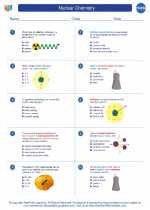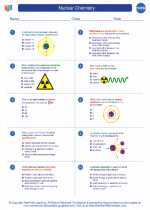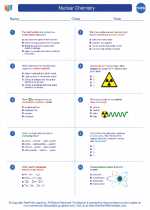Nuclear Chemistry -> radiation
Radiation in Chemistry
Radiation in chemistry refers to the process of emitting energy in the form of waves or particles. This phenomenon is crucial for understanding various chemical reactions, nuclear processes, and the behavior of matter at the atomic and molecular levels.
Types of Radiation
There are several types of radiation relevant to chemistry:
- Electromagnetic Radiation: This includes visible light, ultraviolet light, infrared radiation, microwaves, and radio waves. These forms of radiation are involved in various chemical processes, such as electronic transitions in atoms and molecules.
- Nuclear Radiation: This type of radiation consists of alpha particles, beta particles, gamma rays, and X-rays. Nuclear radiation plays a critical role in nuclear reactions and radioactive decay processes.
- Ionizing Radiation: Radiation that has enough energy to remove tightly bound electrons from atoms, creating ions. It includes X-rays, gamma rays, and high-energy ultraviolet radiation.
Effects of Radiation
Radiation can have both beneficial and detrimental effects on chemical systems and living organisms:
- Beneficial Effects: Radiation is used in various chemical and industrial processes, such as sterilization, food preservation, and medical imaging.
- Detrimental Effects: Exposure to high levels of radiation can damage biological molecules, leading to mutations, cell death, and increased cancer risks.
Applications of Radiation in Chemistry
Radiation has numerous applications in chemistry, including:
- Radiocarbon Dating: Determining the age of organic materials by measuring the amount of radioactive carbon-14 present.
- Radioactive Tracers: Tracking the movement of specific atoms or molecules in chemical reactions and biological processes.
- Radiotherapy: Using controlled radiation to treat cancer by targeting and destroying cancerous cells.
Studying Radiation in Chemistry
To understand radiation in chemistry, students should focus on the following key concepts:
- The electromagnetic spectrum and the interactions of different types of electromagnetic radiation with matter.
- The properties of nuclear radiation, including its ionizing nature and its effects on atomic nuclei and radioactive decay.
- The applications and implications of radiation in various chemical and biological contexts.
Further Exploration
For further exploration, students can delve into the quantum mechanical aspects of radiation-matter interactions, the role of radiation in spectroscopy techniques, and the advancements in radiation-based technologies in various fields.
[Radiation] Related Worksheets and Study Guides:
.◂Chemistry Worksheets and Study Guides High School. Nuclear Chemistry

 Worksheet/Answer key
Worksheet/Answer key
 Worksheet/Answer key
Worksheet/Answer key
